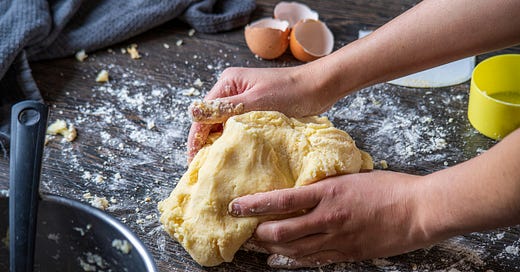New Study Suggests Most Anti-Gluten People are Nuts
Not really, but they may be blaming the wrong guy.
I wrote a few words about gluten a few weeks ago (“Aint So Bad—Foods or Food Products That Have Gotten a Bum Rap”), but a new study just surfaced, and it has all the gluten-sensitive people feeling the same levels of bloating and indigestion they presumably get from eating a box full of gluten-rich beignets.
As such, I need to readdress the issue.
In case you didn’t read any reports on the study on your news feed, a team of researchers from the University of Melbourne and KU Leuven recruited 36 people, 16 of which believed they were sensitive to gluten and 20 who could eat gluten, wallpaper paste, pig iron, anything they wanted without feeling sick.
Each (none of them knew what they were getting) received yogurt containing either gluten or whey protein (the placebo), accompanied by either a gluten-free muffin or a regular muffin for 5 days. (Obviously, they paired the gluten-free yogurt with the gluten-free muffin or else the study wouldn’t have made any sense.)
Turns out the allegedly gluten-sensitive people felt bloated and tired no matter which pairing of yogurt and muffin they ate. Over half the people in the study blamed gluten when they were actually given the placebo.
The scientists suspected the results might have come from the “nocebo” effect, which is a phenomenon where a person experiences negative health symptoms due to their belief that a treatment will be harmful.
Maybe. But there may also be something else to blame. Also, this wasn’t the first study to report such findings, only the latest.
How Did This Shit All Start?
As I mentioned in that previous article about gluten, I blame that tennis player for most of today's gluten tomfoolery. Yeah, Novak Djokovic. Here's the ridiculous way it went down:
In 2010, Djokovic met with Dr. Igor Cetojevic, a Bosnian Serb who theorized that Djokovic's up-til-then frequent breakdowns on the court were due to a wheat allergy. To prove it, he had Djokovic put one hand on his stomach while holding the other straight out with his palm up. When the doctor pushed down on his outreached hand and told him to fight against the pressure, Djokovic easily resisted.
Cetojevic then told the tennis player to do the same thing while – get this – holding a piece of bread against his stomach. This time, the doctor was able to push down the opposite arm as easily as if it were a willow branch. The doctor then explained that the experiment that turned Djokovic into an open-faced sandwich "showed his body was resisting the wheat," or, more specifically, resisting the gluten inherent to wheat products.
For real.
Good thing the doc didn't suspect an allergy to blueberry pie because that would have left a nasty stain on Djokovic's shirt.
Djokovic, convinced by this modern-day medical Svengali, subsequently gave up eating wheat. Unparalleled success ensued. Djokovic went on to win 21 Grand Slam titles, in addition to winning or doing every other thing possible in the tennis-balling world.
Athletes all over the world adopted a gluten-free diet simply because they thought it would make them perform better too. Regular, non-athlete types also picked up on the gluten phobia. They lit their torches, picked up their pitchforks, and stormed the bread castle -- not to make toast for their club sandwiches -- but to banish it entirely.
Still others abandoned wheat because of the "Wheat Belly" book that was published one year after Djokovic publicly condemned wheat. The book put a fresh spin on the debate, though. It claimed that modern wheat was full of gliadin, a supposedly addictive protein that turns normal humans into bread-seeking zombies who will stop at nothing to gnosh another bagel.
As a result of all that crap and evangelizing from people who’d been “cured” by elimination gluten, a shitload of Americans (at one time, roughly one out of four) adopted a gluten-free, bread free, or at least a gluten or bread-reduced diet, and truth be told, this practice has made many of them perform better and feel better.
Part of it might be because of the "nocebo" effect I mentioned earlier, which is when an inert substance causes perceived harm. Eliminating the nocebo, in this case bread, would result in feeling better and performing better.
More likely, though, there is something in bread that's causing problems, but in the vast majority of cases, it's not gluten -- they're blaming the wrong guy. I know that because only about 5% of the population has celiac disease (the people who really are allergic to gluten), while another 5 or 10% might have "non-celiac gluten sensitivity" (NCGS).
Oh, and that stuff about gliadin, that zombie protein? Those supposedly addictive gliadins are present in all grain lines and some seeds of ancient grains contained even more gliadin than modern lines. Besides, the human gut doesn't appear to even absorb the opioid protein fraction of gliadin.
So, let's forget about the "Wheat Belly" faction of bread phobics and concentrate on what it is about bread that's allegedly causing so many people to have digestive problems.
But There's Gotta' be Some Research to Back Up Fear of Gluten, Right?
About a year after the ridiculous piece-of-bread-on-Djokovic's-tummy fiasco, Peter Gibson, a professor of gastroenterology at Monash University in Australia, published a double blinded, randomized, and placebo-controlled experiment that found gluten to be the cause of gastrointestinal distress in people without celiac disease.
It gave plenty of doughy ammo to the anti-gluten people, but rather than kick back, put his feet on his desk, and gnaw on a tasteless, gluten-free garbanzo-bean biscuit, that same Dr. Gibson got a funny feeling in his stomach that was entirely unrelated to gluten.
Gibson couldn’t figure out what it was about gluten that could be causing problems in people. Also, there were so many variables in his initial experiment that he worried that there might be something he wasn't controlling or taking into consideration, so he decided to repeat the experiment, this time taking extra precautions that are rarely seen in any nutritional research.
He found 37 subjects, none of which had celiac disease but all whose gastrointestinal problems had improved on a gluten-free diet. He then provided all their meals so there was no chance of subjects making midnight runs to Al's Donut Emporium or Taco Cabana.
He eliminated any potential dietary trigger for gastrointestinal problems, including certain preservatives, lactose, and poorly absorbed short-chain carbohydrates known as FODMAPS (Fermentable Oligosaccharides, Disaccharides, Monosaccharides, and Polyols) that are found in a ton of foods, including many bread products.
And, in an effort to leave no stone unturned, he collected everyone's urine and fecal matter for analysis. He also had them all cycle through different diets. They were first put on a low-FODMAPS for two weeks to establish a baseline. In the following days, they were given either a diet high in gluten, one with 2 grams of gluten and 14 grams of whey protein isolate (the low-gluten diet), or one with 16 grams of whey protein isolate (the placebo diet).
No one ever knew what diet they were on. When he looked at the results, he found that all the diets worsened gastrointestinal symptoms to a similar degree! He concluded that it was psychological and since participants expected to feel worse, they did.
Gibson was forced to conclude that, "In contrast to our first study...we could find absolutely no specific response to gluten." But before you gluten skeptics get too smug, Gibson and his co-researcher, Jessica Biesierkierski, did find a culprit. Their study showed that it was far more likely that it was the FODMAPS that were causing the gastrointestinal problem previously attributed to gluten.
Remember that I wrote that the subjects were first put on a low-FODMAP diet to establish a baseline? Well, according to Biesierkierski, "Reduction of FODMAPS in their diets uniformly reduced gastrointestinal symptoms and fatigue in the run-in period, after which they were minimally symptomatic."
And get this, when you stop eating bread products, as is the most universal attribute of the low-gluten diet, you automatically remove some of the largest dietary sources of FODMAPs. That could well explain why so many people claim to feel better when they go on bread-free diets. FODMAPS are poorly absorbed by pretty much all of us human types, and any that aren't absorbed by the small intestine pass onto the large intestine where they're fermented by bacteria.
The resultant gas formation causes some people, probably those with an overpopulation of certain bacteria and an underpopulation of others, to experience symptoms similar to irritable bowel syndrome, which could easily be misconstrued as gluten sensitivity.
Is That All You Got, Those Two Measly Studies?
A more recent study conducted by Oslo University Hospital in Norway (Skodje, et al. 2018) had the same goal, to find out if it was really gluten that was giving people gastrointestinal woes. They rounded up 59 people with known gluten sensitivity and gave them each one type of muesli bar to eat for a week:
• One with 5.7 grams of gluten
• One without gluten but with 2.1 grams of fructans (a type of FODMAP)
• One that was a placebo (contained neither gluten nor fructans)
The participants were asked to rate their levels of bloating, stomach pain, and gassiness after eating the bars. They then underwent a 7-day washout period (until the symptoms from the previous challenge had resolved), after which they crossed over into another group and repeated the test. This continued until all participants had eaten each of the three different bars for a week.
Hold on tight to the sides of your toilet seat because the gluten group came in last at causing problems. In fact, they found "no significant effect" from gluten. The fructans bar caused the most problems.
And then of course there’s the most recent study, the one I alluded to in the opening paragraphs that’s currently causing all the hoopla. The results of that one, too, could have been influenced by FODMAPS as muffins are often a rich source of them.
So, What Foods Contain FODMAPS?
As implied above, fructans are present in wheat, spelt, rye, and barley, the main components of many breads, so when people with digestive problems eliminate bread from their diet, they're automatically getting rid of one source of their difficulties.
Fructans are only one member of the FODMAP group, though. The acronym stands for "fermentable oligosaccharides, disaccharides, monosaccharides, and polyols. All four are small-chain carbohydrates that occur naturally and that are easily fermented by intestinal bacteria, leading to irritable bowel syndrome (IBS) and gastrointestinal upset in general.
The damnable thing is that they're in a lot of foods. It'd be great if people susceptible to FODMAP problems could eliminate all their problems by just avoiding bread, but unfortunately, it's not the case. Here are some of the foods highest in FODMAPS that susceptible people might want to limit or avoid:
Vegetables and Legumes
Garlic
Onions
Asparagus
Beans, e.g., black, kidney, lima, soya
Peas
Mushrooms
Cabbage (savoy)
Cauliflower
Fruit
Apples
Apricot
Avocado
Bananas (ripe)
Blackberries
Grapefruit
Mango
Peaches
Pears
Plums
Raisins
Sultanas
Watermelon
Meat Products
Sausages (some)
Processed meat (some)
Breads, Cereals, Grains, and Pastas
Barley
Bran
Cous cous
Granola
Muesli
Muffins
Rye
Seminola
Spelt
Wheat foods
Nuts and Seeds
Cashews
Pistachio
Milks
Cow's milk
Goat's milk
Sheep's milk
Soy milk
Dairy and Eggs
Buttermilk
Cream
Custard
Greek yogurt
Ice cream
Sour cream
Yogurt
Cheeses
Cream cheese (over 2 tbsp)
Ricotta
Condiments
Hummus dip
Jam (mixed berries)
Pasta sauce (cream based)
Relish
Sweeteners
Agave
High Fructose Corn Syrup (HFCS)
Honey
Inulin
Isomalt
Maltitol
Sorbitol
Xylitol
Drinks
Apple juice
Pear juice
Mango juice
Sodas with HFCS
Herbal tea (strong)
Beer (even though it's made from barley, wheat, or rye, it still qualifies as a low-FODMAP food)
I know what you're thinking: "Jeebus! Can't I eat anything safely?" Sure. The list of low-FODMAP foods is too long to include here, but suffice it to say you can base your meals around things like the following:
• Eggs and Meats
• Cheeses like cheddar, cottage cheese, Swiss, Mozzarella, feta, brie, and Camembert.
• Almond, rice, coconut, or oat milk.
• Grains like quinoa, oats, popcorn, and rice.
• Seeds like almond, peanuts, walnuts, sunflower seeds, and pecans.
• Vegetables like potatoes, corn, pumpkin, red peppers, carrots, eggplants, tomatoes, cucumbers, and zucchini.
• Fruits like grapes, oranges, cranberries, raspberry (no more than about 30), strawberries, blueberries, and pineapple.
How to Use This Information
Here's what I recommend doing:
1. Look at the evidence and at least be open to the idea that some cases of alleged gluten insensitivity are psychological and the result of the "nocebo" effect. It's not hard to imagine, especially with so many yahoos claiming that eliminating gluten was the athletic game-changer they'd been waiting for.
2. If being gluten-free has allowed you to lose weight, consider that most people start to lose weight whenever they start following any diet where they're forced to pay attention to what they're eating. Not only that, but gluten-free diets are restrictive, so you're bound to lose weight.
3. If you suffer legitimate gastrointestinal problems that seem to disappear after going gluten-free, consider that it might be related to FODMAPs and not gluten. After all, low or no-gluten diets are also low in FODMAPs.
4. If you suspect that FODMAPs might be a problem for you, information on low-FODMAP diets is widely available. Start by monitoring how you feel after you eat any high-FODMAP, low-gluten foods. If those foods cause gastrointestinal rumbling or worse, it's a good chance you're sensitive to FODMAPs. People with FODMAPs sensitivities might also want to start taking probiotics and eating probiotic foods to see if they have any benefit.
5. If you don't have celiac disease or NCGS, accept that going on a no or low-gluten diet isn't going to do squat for your athletic ability.
6. If, however, you belong to the small percentage of people who have celiac disease or have NGCS, stay the course and continue to avoid all things gluten.
###
References:
Julie Iven, Annelies Geeraerts, et al. Impact of Acute and Sub-Acute Gluten Exposure on Gastrointestinal Symptoms and Psychological Responses in Non-Coeliac Gluten Sensitivity: A Randomised Crossover Study, UEG Journal, 26 March 2025
Jessica Biesierkierski, Peter Gibson, et al. Gluten causes gastrointestinal symptoms in subjects without celiac disease: a double-blind randomized placebo-controlled trial, AJG, March 2011, Volume 106 – Issue 3 – p 508-514.
Jessica Biesierkierski, Peter Gibson, et al. No effects of gluten in patients with self-reported non-celiac gluten sensitivity after dietary reduction of fermentable, poorly absorbed, short-chain carbohydrates. Gastroenterology, 2013 Aug;145(2):320-8.
Gry Skodje, et al. Fructan, Rather Than Gluten, Induces Symptoms in Patients with Self-Reported Non-Celiac Gluten Sensitivity, Gastroenterology, 2018; 154:529-539.
FODMAP Diet Chart, Ibsdiets.org








Interesting........................ I really mean that!! Still digesting the information, so to speak.